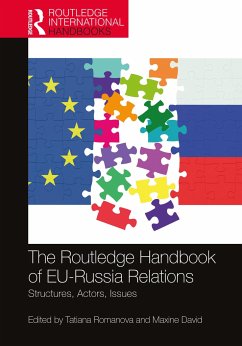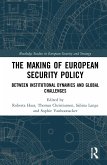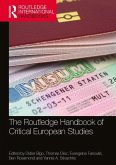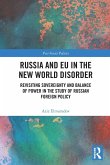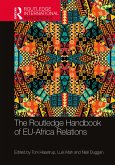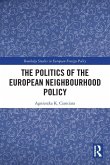The Routledge Handbook of EU-Russia Relations offers a comprehensive overview of the changing dynamics in relations between the EU and Russia provided by leading experts in the field.
Coherently organised into seven parts, the book provides a structure through which EU-Russia relations can be studied in a comprehensive yet manageable fashion. It provides readers with the tools to deliver critical analysis of this sometimes volatile and polarising relationship, so new events and facts can be conceptualised in an objective and critical manner. Informed by high-quality academic research and key bilateral data/statistics, it further brings scope, balance and depth, with chapters contributed by a range of experts from the EU, Russia and beyond. Chapters deal with a wide range of policy areas and issues that are highly topical and fundamental to understanding the continuing development of EU-Russia relations, such as political and security relations, economic relations, social relations and regional and global governance.
The Routledge Handbook of EU-Russia Relations aims to promote dialogue between the different research agendas in EU-Russia relations, as well as between Russian and Western scholars and, hopefully, also between civil societies. As such, it will be an essential reference for scholars, students, researchers, policymakers and journalists interested and working in the fields of Russian politics/studies, EU studies/politics, European politics/studies, post-Communist/post-Soviet politics and international relations.
The Routledge Handbook of EU-Russia Relations is part of a mini-series Europe in the World Handbooks examining EU-regional relations established by Professor Wei Shen.
Coherently organised into seven parts, the book provides a structure through which EU-Russia relations can be studied in a comprehensive yet manageable fashion. It provides readers with the tools to deliver critical analysis of this sometimes volatile and polarising relationship, so new events and facts can be conceptualised in an objective and critical manner. Informed by high-quality academic research and key bilateral data/statistics, it further brings scope, balance and depth, with chapters contributed by a range of experts from the EU, Russia and beyond. Chapters deal with a wide range of policy areas and issues that are highly topical and fundamental to understanding the continuing development of EU-Russia relations, such as political and security relations, economic relations, social relations and regional and global governance.
The Routledge Handbook of EU-Russia Relations aims to promote dialogue between the different research agendas in EU-Russia relations, as well as between Russian and Western scholars and, hopefully, also between civil societies. As such, it will be an essential reference for scholars, students, researchers, policymakers and journalists interested and working in the fields of Russian politics/studies, EU studies/politics, European politics/studies, post-Communist/post-Soviet politics and international relations.
The Routledge Handbook of EU-Russia Relations is part of a mini-series Europe in the World Handbooks examining EU-regional relations established by Professor Wei Shen.
"This collective volume maps, unpacks and takes stock of EU-Russia relations in all their complexity, multiplicity and versatility. It does so in a crisp, balanced, original and authoritative manner, building on its authors' respective and complementary strengths to make meaningful empirical, theoretical and practical contributions to the study of EU-Russia relations. The authors not only shed light on the past and present of the current crisis; they also reflect on the factors likely to shape this relationship in the future."
David Cadier, Centre for International Studies (CERI) at Sciences Po, Paris, France
"The study of EU-Russia relations is coming of age. This Handbook brings together a representative group of scholars to take comprehensive stock of this maturing field. It analyses the main issues as well as points of divergence, even conflict, and brings badly needed analytical clarity to a relationship currently fraught with problems."
Hiski Haukkala, Tampere University, Finland
"A comprehensive and well-balanced picture of the EU-Russia relations presented by serious scholars from both sides. The book demonstrates the complexity of this uneasy and sometimes controversial relationship, arguing against reductionist black-and-white approaches common on both sides of the European-Russian divide."
Andrey Kortunov, Director General, Russian International Affairs Council, Russia
"Strategic stalemate became a new normal [in] EU-Russia relations. But this is not how Brussels and Moscow imagined a bilateral future almost three decades ago. This volume takes readers on a guided tour through multiple vicissitudes in the complex [EU-Russia] relations. Most importantly, this timely read reveals in great detail why, in spite of enduring economic interconnectedness, sides, over the last few years, fell further apart."
Stanislav Secrieru, European Union Institute for Security Studies
David Cadier, Centre for International Studies (CERI) at Sciences Po, Paris, France
"The study of EU-Russia relations is coming of age. This Handbook brings together a representative group of scholars to take comprehensive stock of this maturing field. It analyses the main issues as well as points of divergence, even conflict, and brings badly needed analytical clarity to a relationship currently fraught with problems."
Hiski Haukkala, Tampere University, Finland
"A comprehensive and well-balanced picture of the EU-Russia relations presented by serious scholars from both sides. The book demonstrates the complexity of this uneasy and sometimes controversial relationship, arguing against reductionist black-and-white approaches common on both sides of the European-Russian divide."
Andrey Kortunov, Director General, Russian International Affairs Council, Russia
"Strategic stalemate became a new normal [in] EU-Russia relations. But this is not how Brussels and Moscow imagined a bilateral future almost three decades ago. This volume takes readers on a guided tour through multiple vicissitudes in the complex [EU-Russia] relations. Most importantly, this timely read reveals in great detail why, in spite of enduring economic interconnectedness, sides, over the last few years, fell further apart."
Stanislav Secrieru, European Union Institute for Security Studies

